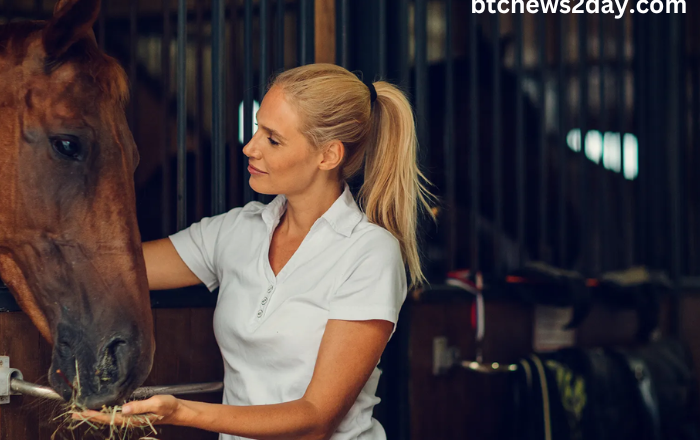Bringing a horse into your life is a rewarding and enriching experience, but it also comes with significant responsibilities. Proper horse care is essential to ensure the well-being and happiness of your equine companion. This comprehensive guide will cover the fundamental aspects of horse care that every new owner needs to know. Discover a wide range of courses at casacourses. Enhance your skills and knowledge with our comprehensive online learning platform. Join us today!
Housing and Shelter
Providing appropriate housing is crucial for your horse’s health and comfort. Horses need a clean, safe, and spacious environment to thrive. Options for housing include:
- Stables/Barns: These offer protection from extreme weather and provide a controlled environment. Stalls should be well-ventilated, with clean bedding such as straw or shavings.
- Pastures: Horses benefit from spending time outdoors. Ensure that pastures are secure, free of hazardous objects, and have adequate grazing. Provide access to shade and shelter, such as a run-in shed, to protect from harsh weather conditions.
Regularly clean and maintain the horse’s living area to prevent the build-up of waste and parasites, which can lead to health issues.
Nutrition and Feeding
A balanced diet is vital for your horse’s health. Horses are grazers, naturally eating small amounts of food throughout the day. Key components of a horse’s diet include:
- Forage: High-quality hay or pasture grass should make up the majority of your horse’s diet. Forage provides essential fiber and nutrients.
- Grain: Supplementing with grains like oats, barley, or corn can provide additional energy, especially for working horses. However, grain should be given in moderation to prevent digestive issues.
- Water: Fresh, clean water must be available at all times. Horses can drink up to 10 gallons of water a day, more in hot weather or if they are very active.
- Supplements: Depending on your horse’s specific needs, supplements such as vitamins, minerals, and electrolytes might be necessary. Consult with a veterinarian to determine the appropriate supplements.
Feed your horse at regular intervals and monitor their weight and condition to adjust their diet as needed.
Health Care
Maintaining your horse’s health involves regular veterinary care, vaccinations, and preventive measures. Key aspects include:
- Veterinary Visits: Schedule routine check-ups with a veterinarian to monitor your horse’s overall health. Address any health issues promptly.
- Vaccinations: Keep your horse up to date on vaccinations to protect against diseases such as tetanus, influenza, and West Nile virus.
- Deworming: Implement a deworming program to control internal parasites. Your vet can recommend an appropriate schedule based on your horse’s needs.
- Dental Care: Horses’ teeth continuously grow, and uneven wear can cause problems. Regular dental check-ups and floating (filing down sharp points) are essential.
- Hoof Care: Hoof health is critical. Schedule regular visits with a farrier for trimming and shoeing if necessary. Daily cleaning of hooves helps prevent infections and injuries.
Grooming
Regular grooming helps maintain your horse’s coat, skin, and overall health while also strengthening the bond between you and your horse. Essential grooming tools include:
- Brushes: Use a curry comb to loosen dirt and stimulate the skin, followed by a stiff brush to remove dirt and a soft brush for a smooth finish.
- Hoof Pick: Clean your horse’s hooves daily to remove debris and check for signs of injury or infection.
- Mane and Tail Combs: Keep the mane and tail untangled and free from dirt. Be gentle to avoid pulling out hair.
- Bathing: Occasionally bathe your horse using a mild horse shampoo, especially if they get very dirty. Avoid over-bathing to prevent drying out the skin.
Exercise and Mental Stimulation
Horses need regular exercise to maintain physical and mental health. Exercise routines can include:
- Riding: Depending on your horse’s training and your interests, this can include trail riding, dressage, jumping, or other disciplines.
- Ground Work: Lunging, long-lining, and other ground exercises help build trust and communication between you and your horse.
- Turnout Time: Allow your horse ample time to roam and interact with other horses if possible. Social interaction is important for their mental well-being.
Incorporate variety in your horse’s exercise routine to keep them engaged and stimulated.
Understanding Behavior and Communication
Learning to read and understand your horse’s behavior is key to providing effective care. Horses communicate through body language, and being attuned to their signals can prevent accidents and strengthen your bond. Signs to watch for include:
- Ears: Forward ears indicate interest, while pinned ears suggest anger or discomfort.
- Tail: A relaxed tail is a good sign, while a swishing or clamped tail can indicate irritation or fear.
- Eyes: Bright, attentive eyes show a content horse, while dull or tense eyes may signal stress or illness.
By understanding these signals, you can respond appropriately to your horse’s needs and ensure their well-being.
Conclusion
Caring for a horse is a rewarding journey that requires commitment, knowledge, and compassion. By providing proper housing, nutrition, health care, grooming, exercise, and understanding their behavior, you ensure that your horse lives a healthy, happy, and fulfilling life. The bond you develop with your horse through dedicated care and attention will be one of the most gratifying aspects of horse ownership.
